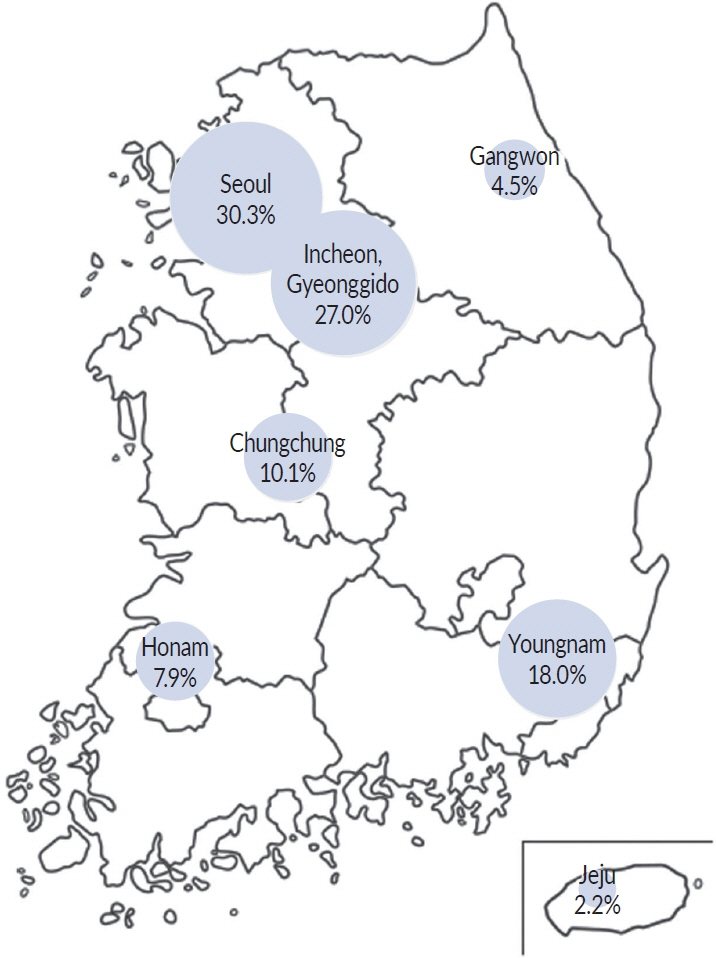J Korean Neurosurg Soc.
2025 Jan;68(1):97-104. 10.3340/jkns.2024.0132.
Assessing and Charting the Future Path : Addressing the Decline of Brain Tumor Specialists in Korea - Insights from the Korean Brain Tumor Society (KBTS) Future Strategy Committee of 2023
- Affiliations
-
- 1Department of Neurosurgery, Korea University Guro Hospital, Korea University College of Medicine, Seoul, Korea
- 2Department of Neurosurgery, Gyeongsang National University Hospital, Gyeongsang National University College of Medicine, Jinju, Korea
- 3Department of Neurosurgery, Inha University Hospital, Inha University College of Medicine, Incheon, Korea
- 4Department of Neurosurgery, Gachon University Gil Medical Center, Gachon University College of Medicine, Incheon, Korea
- 5Department of Neurosurgery, Gangnam Severance Hospital, Yonsei University College of Medicine, Seoul, Korea
- 6Department of Neurosurgery, Incheon St. Mary's Hospital, College of Medicine, The Catholic University of Korea, Seoul, Korea
- 7Department of Neurosurgery, Dongsan Medical Center, Keimyung University School of Medicine, Daegu, Korea
- 8Division of Neuro Oncology, Department of Neurosurgery, Samsung Changwon Hospital, Sungkyunkwan University School of Medicine, Changwon, Korea
- 9Department of Neurosurgery, Chungnam National University Hospital, Chungnam National University College of Medicine, Daejeon, Korea
- KMID: 2562986
- DOI: http://doi.org/10.3340/jkns.2024.0132
Abstract
Objective
: Although Republic of Korea is an advanced country in medical technology with a successful treatment rate for serious diseases, such as cancer, and has improved technology for highly difficult surgery, many excellent medical doctors and physicians are struggling due to the recent unreasonable medical environment. Specialization in brain tumor surgery also faces challenges in Republic of Korea, including low financial incentives, legal threats, and limited career prospects. In response, the Korean Brain Tumor Society (KBTS) formed the Future Strategy Committee to assess these obstacles and propose solutions.
Methods
: A survey was conducted among the KBTS members to understand their perceptions and concerns across different career stages.
Results
: The findings revealed a decline in interest among chief residents in brain tumor surgery, owing to limited job opportunities and income prospects. Neurosurgical fellows expressed neutral satisfaction but highlighted challenges, such as low patient numbers and income. Faculty members with varying levels of experience echoed similar concerns, emphasizing the need for improved financial incentives and job stability. Despite these challenges, the respondents expressed dedication to the field and suggested strategies for improvement.
Conclusion
: The KBTS outlines a vision that focuses on practical excellence, comprehensive research, professional education, responsibilities, and member satisfaction. Addressing these challenges requires collaborative efforts among healthcare institutions, professional societies, and policymakers to support brain tumor specialists and enhance patient care.
Keyword
Figure
Reference
-
References
1. Bang JS. Efforts needed to maintain and develop essential medical services in the neurosurgery field. J Korean Med Assoc. 66:4–9. 2023.
Article2. Cheong YS. Critical care crisis and medical professionalism. Korean J Med Ethics. 26:245–256. 2023.
Article3. Kim HJ, Cho WH, Sohn M, Park EC. Comparison of relative value on physician payment schedule for reimbursement of health insurance between Korea and U.S.A. Korean J Health Policy Administration. 2:1–16. 1992.4. Kim HS, Lee JK, Kim KY. Current status and implications of punishment in medical practice. Available at : https://rihp.re.kr/bbs/board.php?bo_table=research_report&wr_id=338&sst=wr_hit&sod=desc.5. Kwak SY. Problems of the Korean Healthcare System and the Direction of Improvement by the OECD. Available at : https://repository.hira.or.kr/handle/2019.oak/776.6. Park HS, Oh SY, Kim A. The issues in obstetric no fault compensation act and suggestions for the improvement. Korean J Perinatol. 24:65–71. 2013.
Article


